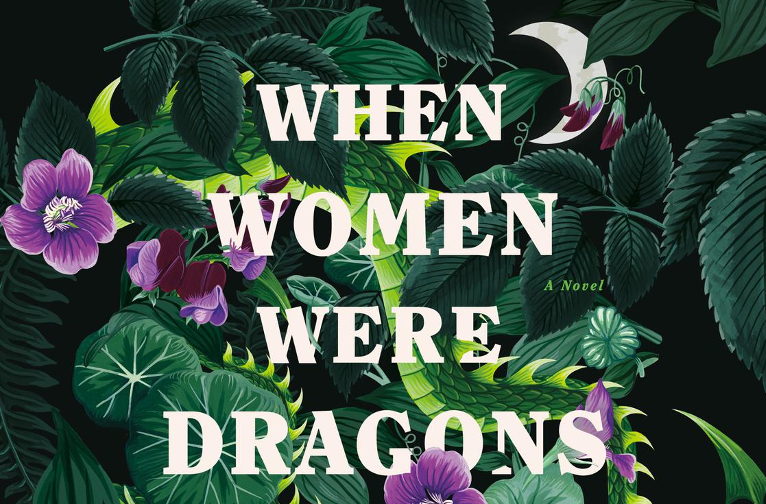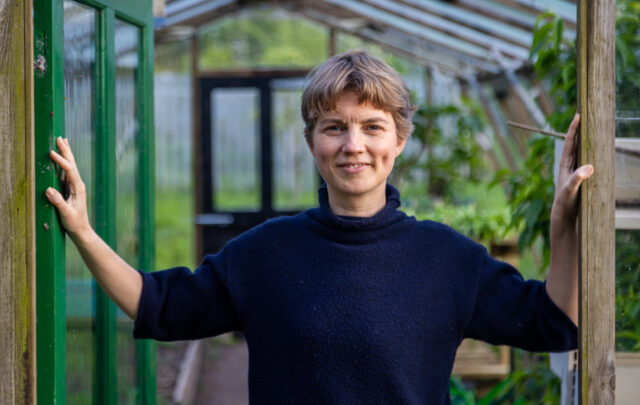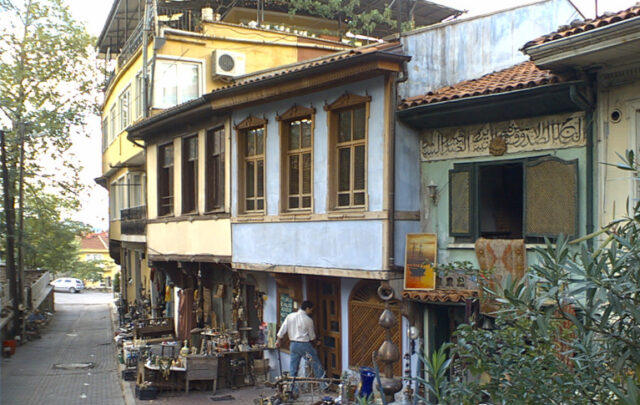I love reading stories. I love hearing tales. I love seeing the world through the other eyes of a book’s characters and ultimately the author. I love the invented worlds that can only be found in fiction. I love books! However, it is rare that I encounter a life-changing idea in fiction. But when that does happen, when I have those Ah-ha! moments while reading fiction, when I gain fresh insights inspired by the words and ideas presented in a novel, when I learn new ways to approach life, the creator is almost always a woman. So, this week that insight struck, and I was not at all surprised that the author responsible was Kelly Barnhill. However, because I’m older and slower now, it took a contrast with someone else’s ideas for me to recognize that I’d experienced a revelation.

I finished reading When Women Were Dragons in the morning (in tears… of rage, joy, and grief… even at the brief section Barnhill included in the acknowledgements on her inspiration for this tale). Yes, I knew it was a great book. I desperately wanted to immediately open it right back up and read it again. That, too, is rare for me. (There are so many books, you see…). But I did not realize that I was chewing so very deeply on this book until later in the day as I was ironing (my summer business attire is unfortunately linen heavy…) and listening to two white guys talk about societal complexity. Now, these are two white guys who I deeply respect, two white guys who have both been formative on my thinking, two white guys that I would not normally dump into that “white guys” category, but…
I was bothered by the way they both seemed to use “human” interchangeably with what I think is a very small subset of the human animal — those currently in positions of privilege within existing wealthy societies — and did not seem to notice anything wrong with saying “we” for “humanity”. Being female and growing up in a very colorful crowd, I have always been sensitive to language bias, the way English, in particular, excludes by definition. Literally… But this discussion felt even more abrasive than usual. I was halfway through the shirts when I finally understood why.
It’s because Barnhill gave me that Ah-ha! moment. Rather, it was a “Finally! Something that might bloody well work!” moment. I had to process to get that moment out of the limbic system and into the rational brain though. Because the “it” — dragons — doesn’t actually exist in this world (to my knowledge anyway…). So it took listening to two white guys talk about “our human inability” to include the future in our decision-making, “our human tendency” to use complexity to solve problems, “our human proclivity” toward increasing consumption of energy whenever “we” find windfall sources, and most offensively the assertion that there is a complete absence of any anthropological record of “we humans” as a society intentionally walking away from a system of hierarchical control and unsustainable resource use.
Um… yes, there is…
I’m from one such place and have many friends who are the descendants of one such society.
Now, this is worse than merely being unaware of some remote geographic region. Because this is New Mexico, and I know for a fact that both of these guys have been there. At least one has lived nearby and extensively studied its history. No, they both know the narrative of New Mexico, but it seems that they simply did not recognize what they were seeing. I don’t like to think that this may be because their “we” is only a bit player in this region. But whatever the reason for the lack of recognition, I think they may need new perspective on who “we” are and what “we” have done.
They may need to read When Women Were Dragons…
There is far less collapse in the world than Jared Diamond would have us believe. I know that most white guys know this, but yet they still largely speak in terms of collapse when they encounter change in the historical record, especially a change from a complex hierarchical system or a high-resource-use system to a simpler, dispersed way of meeting needs that confines itself to ecological boundaries. Not all simplifying change in order is collapse. (For that matter, not all order is complex, hierarchical and resource-intensive.) Some change is just change, often intentional change even… Yes, some systems have collapsed, but these seem to be more the exception than the rule. Recent research is even questioning such archetypical cases of collapse as the end of the Roman Empire, stressing the continuity of Roman culture and spread of Roman values and ideas that took place long after the sack of Rome.
Now, what is undeniable is that systems of domination and hierarchy break down — rulers are no longer so — when limits are breached. Limits of energy use, limits of popular will, limits of the sort of mentality that allows one group to dominate many others with no resulting psychological handicaps. But this is not at all the same thing as a collapse of society. It is not the end of a culture or a system of meeting needs. The part of a system that breaks first when limits are strained — that top tier of the parasitically powerful — often has very little to do with average culture and nothing at all to do with needs. The line of Roman emperors failed because it became a role that was too mired in bureaucracy and violence to manage without excessive resource use, and it was never all that great even at its best. However, Roman culture — everybody underneath the emperor and all their complex systems of interaction — continued all across Europe and much of western Asian, pretty much unabated right up until the Enlightenment. At which point they merely switched gods…
But Chaco Canyon does not represent a collapse. It is a change. The people who built Chacoan culture are still there in New Mexico, practicing Chacoan culture in almost exactly the same terms. There may be less trade for shells and feathers and turquoise (maybe, slightly) and there’s definitely a new emphasis on sheep and horses and dilapidated pick-up trucks, but a Chacoan from the 11th century would be perfectly at home in Acoma Pueblo, to use just one example of many. Because Acoma is just like their Chacoan home; Acoma is the direct descendant of Chaco.
This was not a collapse, but a change of address. Chaco Canyon experienced some nasty heat in the Medieval Warm Period, and there were trading partner issues as Central America dealt with its own climate problems. So in response to increasingly unmanageable systems that were unable to adapt to change, the Chacoans just walked away to greener bits of desert and became a bit more insular — though even that characterization seems to be losing favor as we reinterpret evidence of trade patterns that might have shifted north and west instead of south. In any case, their way of life did not change. Their culture did not change. Their methods of meeting needs, their definition of need did not change. The actual people did not change — until the Athabaskans danced their way south into the desert and then the Spaniards marched north a few generations later. The change was purely one of consciously choosing to constrain themselves to living within the limits of a changing environment. To give up what was not working within those limits and try something new.
Moreover, this seems to have been a peaceful and perhaps coordinated change. There is little evidence of violence other than what might be expected in an increasingly stressful climate (heat does make people crazy). In fact, there are many Puebloan (and Navajo) stories that indicate that walking away from over-consumption in an orderly fashion was and is the norm for their cultures. When things get too affluent, they close up shop, give away everything in a fabulous potlatch, and amble off into the desert to build a nice quiet life someplace else.
It seems that most white guys can’t imagine this. They can’t conceive of any human refusing the lure of power nor, once power is obtained, voluntarily giving it up. This is their greatest blindness — and their greatest weakness. And I think that this deficiency of imagination is why our socio-economic systems are stuck, completely unable to accomplish anything toward adapting to the messes we have made. This is largely because those who are sunk deepest into this crisis of creativity are also those who are in charge.
What is difficult is that these people do not want the system that benefits them to fall apart. They are clinging tenaciously to this broken husk. If they are trying to make changes at all, they are attempting to do so from within the system that caused all the problems. They are seemingly unwilling and unable to consider giving up their privilege, and so they are unwilling and unable to dismantle the unjust system that gives them all that power. They think this refusal to give up power is “human nature”, apparently. But it is anything but generally human.
Those entitled people in this system can’t imagine refusing domination, and so they can’t see how exceedingly rare this trait is — when, arguably, that ought to be obvious. An organism that is not self-limiting is not likely to exist for very long; it certainly is not going to be common. A being or system that is self-aggrandizing is, by definition, out of ecological balance and thus quite likely to rapidly destabilize its environment, wiping itself out along with whatever trips over it — and this is exactly what is happening today. Power-over is deadly, and not merely in a touchy-feely metaphorical fashion. It is evolutionarily maladaptive. It does not arise often, and when it does, it quickly exterminates itself. Power-over is not a “human” trait… or humans would not exist…
There are so many books in this culture that grapple with the apparent scarcity of domination systems. White men seem to be truly perplexed by the fact that empires are few and fleeting. And yet they also don’t acknowledge that there are other ways of organizing society — or not. To the privileged in this domination system, civilization means empire. They define culture in terms of this one system that elevates themselves and then, by definition, they don’t see all the far more common ways of being that do not put them on top. Many textbooks fairly bluntly state that any intricate and complex culture, one that has many interdependent facets, is also a system of self-aggrandizement, of power-over, of empire. And this is simply not true. Not in the past and not now.
There have been and there remain many intricate cultures that never fell prey to systematic domination and the intense resource use of maintaining status. There are far more of them than there are of empires. They are more durable and lasting. And these egalitarian systems of meeting needs — that is, meeting the needs of all in equitable fashion — are far easier to manage. Well, of course they are. There is no need for the herculean efforts that we, in this culture, direct toward maintaining status.
However, a culture that does not churn resources into status for one group is not necessarily simple. Is it not likely that the culture that built Newgrange was mind-bogglingly complex? And yet there is little evidence of social stratification or resource depletion associated with that very long time period. In fact, many of the most ornately beautiful cultures — those that put effort and materials into the common good, into creativity and into intellectual achievement — are also not notably divided. Again, this makes perfect sense. There are more resources to devote to everybody — including non-humans and all those who have not yet been born — when the goal is not to send every last thing to this one very small elite group.
So there are plenty of examples of cultures that elaborate ways to meet human needs in wonderful yet sustainable and just fashion. We can find models for resilient organization and toolkits in nearly every time and place. In fact, it would seem that this white guy culture is one of the very few that does not work well for everybody. (And again, of course, this is by design.) But to see these examples, we have to define “we” as everybody and “culture” as what everybody does. We have to stop privileging white guys even in our conversations about fixing the messes made by… these same guys.
And this privileging the current culture of mess is, I think, partly why it took me all day to realize that I’d just encountered a way to fix those messes. Though, to be fair, Barnhill is telling the story of one of these resilient alternative cultures in terms of dragons. As such, it doesn’t seem like a road map for reality. But it is. Because Barnhill’s dragons are women.
In this parallel world, the horror of cultural misogyny is given a dragon shape, but this is still hate and abuse directed at women (and a few other out-groups) because they are women. We are all aware of the problems that this culture has with women (and dragons). But we tend to be blind to the potential, the hope embodied in women because the dominant culture actively suppresses all about women that is positive, strong and independent of that dominant culture. Barnhill explicitly shows us that potential and that hope.
She says: Unleash the dragons! Give those who already do the work of meeting human needs the freedom and support to do that work unhindered, and — miracle of miracles! — the work gets done! Needs are met! If we want to clean up the world, then let women get on with that. Give women the autonomy and access to means, and they will create a culture and a physical environment that enhances life. There will be food and shelter. There will be care work. There will be a focus on development and learning and skills. There will be happy children and strong families. There will be beauty. Creativity. Innovation. There will be far fewer ways to create hierarchy, status, and domination. There will be much less violence. There will be very little capacity for making war when we all are bound together making life.
Barnhill is telling those who are holding us down — to maintain their own superiority — to just get out of our way and let us be who we are, unfettered by this culture of domination and despair. Free us from the chains of grief and trauma, and we will do what we’ve always done — make a better world for our children. Let us embody our full selves, and we have the power within to work magic. It is who we are, after all. We make things. We fix things. We nurture and we create. We heal and we help. We plant gardens and make tea. And we don’t set much store on status. We can’t and yet be the collaborative beasts that we are.
And women are nothing if not intensely, perhaps biologically, collaborative. Witness the tendency for menstrual cycles to be in synchrony among women who live in close proximity. I am not sure what biologic advantage this might have conferred. Seems to me like it would be the opposite if all the adult women in a group were simultaneously suffering headaches and cramps and grumpiness. But we are empathic and group-oriented to the point that our bodies will self-organize into a superstructure, even when there is no competitive advantage to doing so.
In one of the most lovely descriptions ever of the collaborative nature of women (and dragons), Barnhill tells of a high school prom in which the girls take over. Their needs and desires becomes unlaced, unbridled, uninhibited. There is a flowing fierce joy that gently bends each will to her sister’s, making a powerful single force out of the many. They dance together into a many-legged, many-lipped cohesion, culminating in the rapture, leaving behind all the chains this culture forges for them, fusing into a beautiful unity, where, paradoxically, each girl more fully inhabits her own unique and individual body. Each becomes more essential, but this essence interpenetrates the whole and is subsumed in the superstructure. Nobody is beyond or above. Nobody is excluded. Nobody leads and yet nobody follows. Every body just is. As she was meant to be. Fully.
But those who would be on top can’t see the beauty of being within. And they are despairing now. I have heard so many of those in privileged positions lamenting our future. They are convinced that “we” will continue on, hurting each other, competing for diminishing resources, killing every part of the planet. Now, there may be a bit of duplicity in those wails. Some may know that there are options and want nothing to do with those options because those options will take away their position of authority. But many, including the two white guys I was listening to while ironing, would see the Earth healed and human culture mended. And yet they can’t relinquish the mentality of the power-over entitlement that this culture confers on them. They refuse to free the dragons. And so they do not see that the dragons are already moving mountains all around the globe.
The thing is, this change we want to see? It is already happening. It has been happening for decades. From the Chipko tree huggers of the 1970s to the water protectors of today, the work of resurrecting and rebuilding is being done. There is such hope — or perhaps a sort of cheerfully grim determination — from the people who are doing this work. People on all the unprivileged and unseen paths are taking life into their own hands. They are building the structure and relationship that “we”, as humans, need. They are turning away from the voices and the ideas that have kept us all enslaved to this one idea: that one tiny group is the only one that gets life.
We are reclaiming it all. In real time. Now. Read Resilience. Every day there are stories of hope and wonder that are even more fantastical than dragon tales for being true. Look past the powerful messaging of this one small group that does not want change and you will clearly see that we are doing this work already.
It may not be enough to save everything. But it will be change enough to keep life going… And it will be good. For the first time in millennia, the dragons will fly free and will do the work that has long been neglected. We will all live fully. And all our lives will have beauty and love and meaning. Because that is who “we” are…
©Elizabeth Anker 2022





